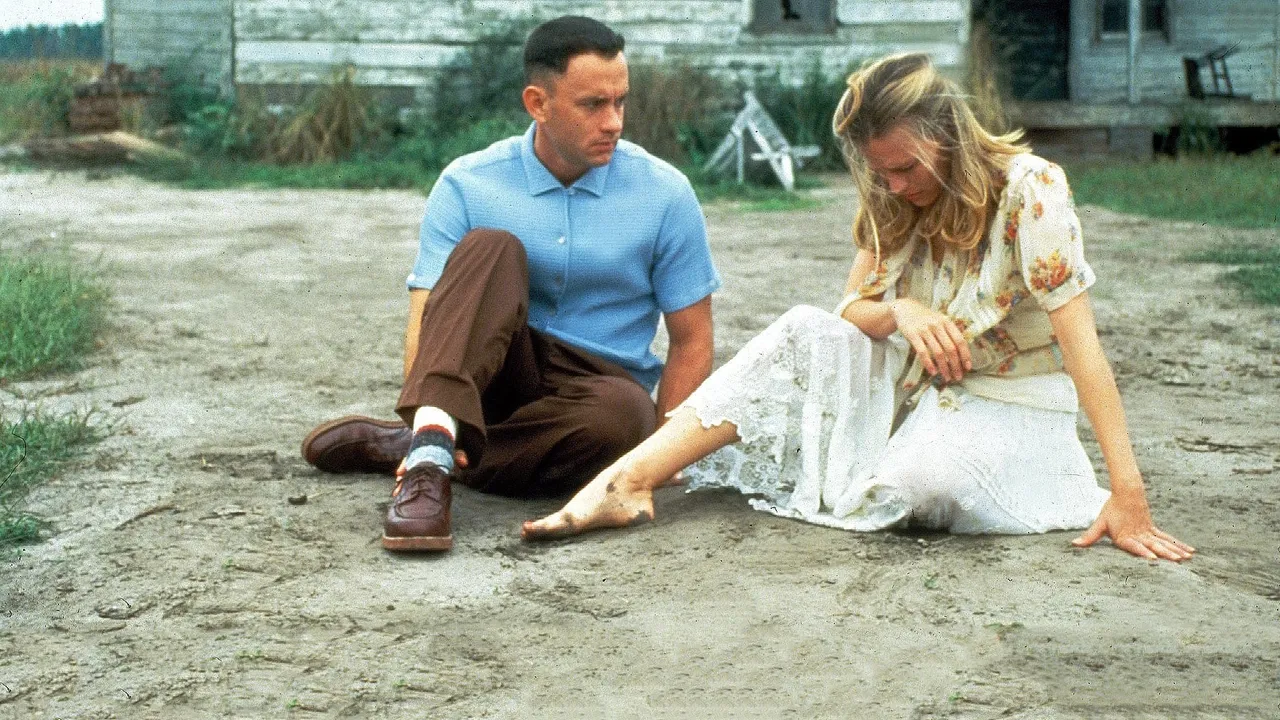
If the main purpose of art is to stir emotions, than Forrest Gump, 1994 epic drama directed by Robert Zemeckis, is one of the most successful pieces of art. Years after the premiere, Forrest Gump still manages to stir strong emotions among people. Few films are so beloved and so passionately hated. Reasons for hatred, like in many similar cases, have very little to with the quality of film - people who hate Forrest Gump simply can't forgive its makers from stealing well-deserved "Oscars" from the hands of those who had made Pulp Fiction. The author of this review is among those who think that Tarantino's film should have won "Oscars". I also recognise that Pulp Fiction had more than worthy opponent in that particular "Oscar" race and that its eventual outcome wasn't such terrible injustice or outrage as many of rabid Pulp Fiction fans would like to believe. Forrest Gump, despite being inferior to Pulp Fiction, is a very good film.
The script by Eric Roth, based on the novel by Winston Groom, follows roughly thirty years in life of Forrest Gump (played by Tom Hanks), Alabama man who has below-the average level of intelligence. His mother (played by Sally Field) always taught him never to see that as disadvantage, and his simple perspective of world helps him not only to always do the right thing, but also to prosper and meet some important persons between 1950s and 1980s - Elvis Presley, George Wallace, JFK, Richard Nixon and John Lennon - in the process. Jenny (played by Robin Wright-Penn), his childhood best friend and love of his life, chose different path and tried all kinds of counter-culture lifestyles. By following their lives and through their encounters the film tells a story about important events in recent American and world history.
If there is a single word that could explain success of Forresz Gump, it is "balance". Screeenwriter Roth and director Zemeckis displayed incredible ability to strike perfect balance between comedy and drama in this film; this film is both serious and funny, entertaining and thought-provoking and it could make people laugh and cry with equal degree of ease. The film owes it not only to good screenplay and perfect direction, but also to excellent acting. Although Tom Hanks undoubtedly owes his second "Oscar" to the usual biases of Academy - his role of psychologically impaired man is among those that were supposed to bring golden statues to the actors playing them – his performance in this film is great. Robin Wright-Penn is somewhat less convincing in her role, but nevertheless effective. Both Hanks and Wright-Penn are overshadowed by supporting players - Sally Field is great in her relatively brief, but memorable role of Hanks' mother, while Gary Sinise simply shines in complex and difficult role of Lt. Dan Taylor. For that achievement Gary Sinise deserved "Oscar", at least with equal merit as Samuel L. Jackson for his role of Jules in Pulp Fiction.
The most talked about thing about Forrest Gump, however, is the way in which it revolutionised modern film making. Until that time, special effects, especially those assisted by CGI technology, were the domain of science fiction and fantasy genre. Forrest Gump was first film to apply them for the purpose of recreating history or saving budgets for regulr sets. Here those effects create surreal and, until that time, unimaginable images of dead historical personalities interacting with present-day actors. Nine years after the premiere those scenes look less than perfect, in some ways almost laughable - this just shows how the technology progressed in relatively short amount of time. This also explains why the concept of objective truth in modern world needs new definitions - many people who today refuse to believe that Saddam Hussein was actually captured can find perfect argument in the technology displayed in Forrest Gump.
At its time, just as now, Forrest Gump was often criticised for its revisionist version of modern American history and less than flattering portrayal of individuals and movements that tried to change status quo of American society. Protagonist, instead of trying to change the world, simply follows the rules, obeys his parents and authorities and gets his reward in the form of business success and family happiness. On the other hand, those who try to rebel and be smarter than the average masses are those who are going to be punished with violence, drugs, AIDS and disillusionment. Some might find traces of Taoism in philosophy of Forrest Gump, but in the end Groom, Roth and Zemeckis provide ending closer to Hegelian dialectics - Gump, as embodiment of "proper" America, and Jenny, as embodiment of counter-culture - reconcile their differences in bittersweet ending that gives hope for future generations. However, many viewers would care little about philosophy or political views displayed in this film; what they would really appreciate is the quality of film making and the way it was used for the purposes of good, human, uplifting story – something we rarely see in Hollywood these days.
RATING: 8/10 (+++)
(Note: The text in its original form was posted in Usenet newsgroup rec.arts.films.reviews on December 5th 2003)
==
Blog in Croatian https://draxblog.com
Blog in English https://draxreview.wordpress.com/
Cent profile https://beta.cent.co/@drax
Minds profile https://www.minds.com/drax_rp_nc
Uptrennd profile https://www.uptrennd.com/user/MTYzNA
Brave browser: https://brave.com/dra011
BTC donations: 1EWxiMiP6iiG9rger3NuUSd6HByaxQWafG
ETH donations: 0xB305F144323b99e6f8b1d66f5D7DE78B498C32A7

